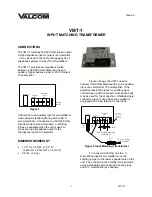
IEEE 802.5 Unshielded Twisted Pair
10-5
Token Ring Network Requirements
IEEE 802.5 Unshielded Twisted Pair
Cable Type
The IEEE 802.5 specification for Token Ring networks requires UTP cabling of
Category 3, 4, or 5. Categories of UTP cabling below Category 3 may not meet the
quality requirements of the networking specification, and may therefore be
unable to meet the tested characteristics listed below. As the requirements for
Category 3 installations are different from those required of a Category 5
installation, the three different cabling types and their respective test
specifications are discussed separately in each section that follows. Each
discussion of a cabling Category differentiates between any specifications for
passive and active Token Ring networking devices.
The Category of cabling used in a network installation is dependent upon all the
components that make up the cabling run. If an installation utilizes Category 5
cabling, and the wallplates and patch panels to which that cabling is connected
are Category 3 compliant, the cable does not meet the EIA/TIA end-to-end
specifications for a Category 5 installation.
Attenuation
The maximum allowable attenuation for any Token Ring UTP cable link is
dependent upon the operating speed of the Token Ring network. Token Ring
networks that operate at a 16 Mbps speed (16 MHz) have more stringent cabling
requirements than those Token Ring networks operating at 4 Mbps (4 MHz).
Token Ring lobe cabling of Category 3 quality that is to be used in a 4 Mbps Token
Ring network is allowed a maximum total attenuation of 56 dB/km at 4 MHz.
Category 3 cabling to be used in a 16 Mbps Token Ring network may not exceed a
total end to end attenuation of 131 dB/km at 16 MHz.
Category 4 lobe cabling intended for use in a 4 Mbps Token Ring network may
not exceed 42 dB/km. If the same Category 4 UTP cabling is to be used in a 16
Mbps Token Ring network, the maximum attenuation allowable is 88 dB/km.
Lobe cabling of Category 5 quality may not be allowed to exceed 42 dB/km for a
4 Mbps network, or 82 dB/km for a 16 Mbps Token Ring.
Attenuation, when calculated, must take all cabling devices in the cable path into
account. A typical attenuation test must include the jumper cabling used at the
station and at the wiring closet, and any patch panels, punchdown blocks, and
wallplates in the installation.
Summary of Contents for 100BASE-FX
Page 1: ...Cabletron Systems Cabling Guide...
Page 2: ......
Page 4: ...Notice ii...
Page 22: ...Cabling Terms 2 8 Test Characteristics...
Page 54: ...Ethernet Media 4 30 Connector Types...
Page 72: ...Full Duplex Ethernet Network Requirements 6 8 Ethernet FOIRL Single Mode...
Page 80: ...Fast Ethernet Network Requirements 7 8 Hybrid Installations...
Page 130: ...FDDI Media 11 16 Connector Types...
Page 136: ...FDDI Network Requirements 12 6 TP PMD STP...
Page 170: ...Connecting and Terminating 14 20 FDDI...
Page 192: ...Index 4...
















































